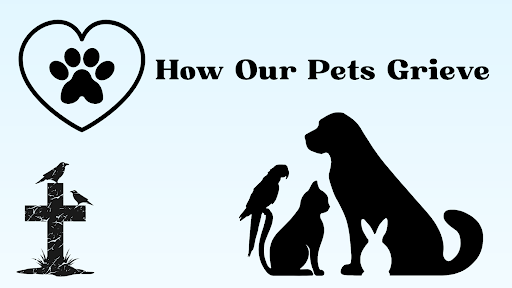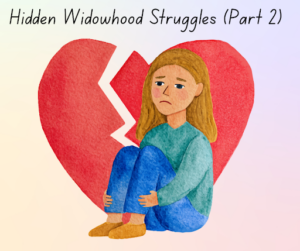We often speak about how everyone’s grief journey looks different and is as unique as the relationship it represents. Grief is so complex that the loss of one person can create many grief journeys. Each individual will grieve in their own way. A family of five that loses someone will have five different grief journeys occurring at the same time. But what about our pets? How do they grieve? Do they feel the loss as well?
Grief is not just a human experience; our pets have also lost someone special to them. They may have even lost their person. Though they may not express their grief in the same way that we do, they feel that absence. Their loss language can be found in their eyes, their actions, and even in quiet sighs. How they move through their days may change, and their routines may change. Through loss, their lives have changed as well, and their grief may show in many different ways.
Pet Grief: Understanding the Heartache Behind Their Eyes
Just as we form connections and bonds to each other as we journey through life, our pets can and do form deep and lasting connections with the people in their lives. When these connections are broken due to loss or other circumstances, our pets can experience sadness, confusion, and even stress. While they may not completely understand death, they know that someone they love is missing. There is a change in the home, in the scents, in the daily patterns, and in the emotions. They feel the difference. Just as our lives have changed, theirs have changed too.
They may begin searching the house, going from room to room, in hopes of locating the one who is missing. Quiet corners may provide a new retreat for them as they search for answers to the change in the routine. They may begin to crave more attention and cling tightly to those who remain at home. Their communication may also change and include more unfamiliar sounds as they try to communicate their feelings of loss.
As we have said many times, every grief journey is unique. This is just as true for animals, as their grieving process may manifest in many ways and differ from the grieving process of another animal. Their behavioral changes can last for days, weeks, or even longer. In some cases, it may also affect their overall health. In that case, you may need to pay close attention and seek vet care if needed.
Why Do Pets Grieve?
Our pets rely on us for food, safety, affection, connection, and a sense of belonging. We are their world, and losing a part of their “pack” can significantly disrupt not only the daily routine but also their sense of connection and stability.
Our pets can often sense our emotions and try to assist us. As such, it is not uncommon for us to see our grief in the eyes and actions of our pets. Both humans and pets feel the absence of the one who has left and are searching for ways to fill the new hole in our hearts.
How can we help our pets with grieving?
Just as we need support and gentleness after a loss, our pets also need stability and comfort. Here are some thoughts on how you can support them:
- Maintain routines: Stick to their routines as closely as possible. Things like feeding, walks, and playtime at familiar times can help restore security and support for them.
- Provide comfort items: Sharing a blanket or article of clothing of your loved one can be soothing. Their scent can help ground your pet.
- Increase gentle connection: Spending time together in quiet comfort can be reassuring. Taking time for petting, talking, and simply being near them can offer stability, reassurance, and stress relief for both of you.
- Encourage engagement: Participating together in light play, walks, or with favorite toys can help lift their spirits and provide an outlet for them.
- Give them time and space: Allow your pets time to grieve. Their grief may look different from what we might expect. Allow them the space to grieve in their own way. Grief has no timeline and takes as long as it takes, for both people and animals.
Our Companions in the Journey
Shadow- Jeni’s dog
On the day I found Bob lying in front of the shed, our dog Shadow was lying next to him. He was trying to get him to move and was determined to protect him. Even so, he allowed all of us to do what was necessary to try to help him. It seemed as though he knew and, just like us, did not want to accept the reality of the situation.
After a bit, I brought home a special treat for Shadow and gave it to him. He took it but did not eat it. In my own grief, I did not realize what he was doing. When Bob was alive, and I brought home a special treat, he would take it and then wait for Bob to come home. He would then show him the treat before he ate it. Shadow carried the treat I brought home for a few weeks before I finally realized what he was doing. I just sadly looked at him and told him that Bob wasn’t coming home. He whined a bit and then slowly sat down and ate the treat.
From the time that Bob died until Shadow passed away a few years later, Shadow sat at the top of the stairs waiting for Bob to come home. Though Shadow was with Bob the day he died, Shadow never lost hope that Dad would come home someday. He was always waiting, always hoping, always missing the person he had lost.
Kristie – Teresa’s Dog
Kristie was our sweet pound puppy, a Pointer Lab mix, that grew into our family’s spoiled princess. Kristie was named because we got her at Christmas time, and we spelled it like Kris because everyone’s name but mine started with K. Kris spoiled her rotten, making her Saturday morning eggs and feeding her his famous brisket when he thought no one was looking. They were bonded tight, and she was more his dog than anyone else. She loved her momma and boys, but mooned over Kris.
When Kris died, she knew. I swear she knew as soon as I walked in, if not sooner. She and I sat on the couch, me bawling and her licking my tears away. She refused to leave my side and hovered by me. An unusual thing for her, as she mostly hung out in her bed or outside.
That first night, I was alone with my best friend downstairs, on the couch, attempting to sleep. There was no way I was going to sleep in my bed. Kristie sat in Kris’s spot on the couch, waiting for him. She was restless, pacing and looking around for him. Deep in the night, I awoke to her sniffing his boots and socks he’d left by the couch. She sat down and howled the most unholy, sad howl I’d ever heard. Owww woooww oooowwww. I jumped up and thought to myself, Oh my God, the dog is grieving Kris, too. I wrapped my arms around her as she continued to whine and howl, and I sobbed. That was when I knew for a fact that pets grieve and grieve hard. I can still hear this gut-wrenching howl and feel the sadness.
We don’t grieve alone, and our pets grieve too. Our pets may never understand why someone is gone, but they know love and the pain of their absence. Pets give us a way to care for our hearts and souls by caring for them through their grief. Step by step, moment to moment, with our pets by our side, we both travel the grief journey moving forward.
Pet Grief Facts
- Pets feel grief and loss, too
Our pets are like our babies, and they are an integral part of the family. Dogs, cats, and many other animals form deep emotional bonds with humans and other pets. When someone they love dies, they notice and they grieve in their own way. - They too miss their person
Pets know there’s been a change, and they miss their person. They may not fully understand or grasp the concept of human death. They fully understand changes in routine, smell, energy, and emotional tone. - Grief shows in their behavior
Grief can look different depending on the species and personality, but you might notice any of the following:
- Changes in appetite: just like us, they may be eating less or refusing favorite treats
- Restlessness or pacing: they can feel our stress and anxiety, and they may act as if they’re looking for the missing person.
- Withdrawal: Pets may also withdraw and sleep more, hide, go off on their own, and avoid interaction.
- Clinginess: Some pets may become your shadow and want to be near you constantly. They may need more pets and snuggles.
- Changes in sleep patterns: Pets may also have more sleep issues. They may be sleeping much more or having trouble settling.
- Signs of physical stress: Grief and loss are stressful for everyone, including our pets. Their stress may show up as digestive issues, excessive grooming, or unexplained illnesses.
- Vocalization changes: You may hear more from your pet, including whining, meowing, or making other unusual sounds.
- Loss of interest: They too may lose interest in play or activities they once enjoyed, especially if it was an activity with their person who’s no longer there.
- Routines matter for both of you
Just like humans, keeping a regular familiar routine is soothing to them. Do what you can to keep feeding, walking, and play times consistent as much as you can. This will help and support you both to feel more secure and grounded during times of emotional upheaval and grief. - Comfort helps both you and your pet
Spending extra time together, giving and receiving comfort, can be a balm for both of you. Spending time in gentle affection and favorite activities can ease their sadness and yours. There’s nothing like petting an animal to release stress and anxiety.
6. Grief has no set timeline
Grief isn’t on a magic timeline for humans nor animals. There is no right or wrong way. Just like us, some pets bounce back quickly while others take weeks or months to adjust. Patience and love are key.
We’d love to hear from you
How have you seen pets grieve? Leave a comment or share this post. Someone else might need to know they’re not the only one feeling this way.
Peace & Blessings,
Teresa & Jeni
PS: For additional support, you can download our free copy of 10 Ways to Move Forward After Loss
The First Days: Coping with Life After Loss is a resource for the first days after a loss – available on Amazon in paperback.
My Journey as a Widow: A Widow’s First Journal is a follow-up journal for processing complex emotions and moving forward with hope. It is available in paperback on Amazon.
Follow us on Social Media:
Facebook: https://www.facebook.com/TornInHalfwidows/
LinkedIn: https://www.linkedin.com/company/torn-in-half/




